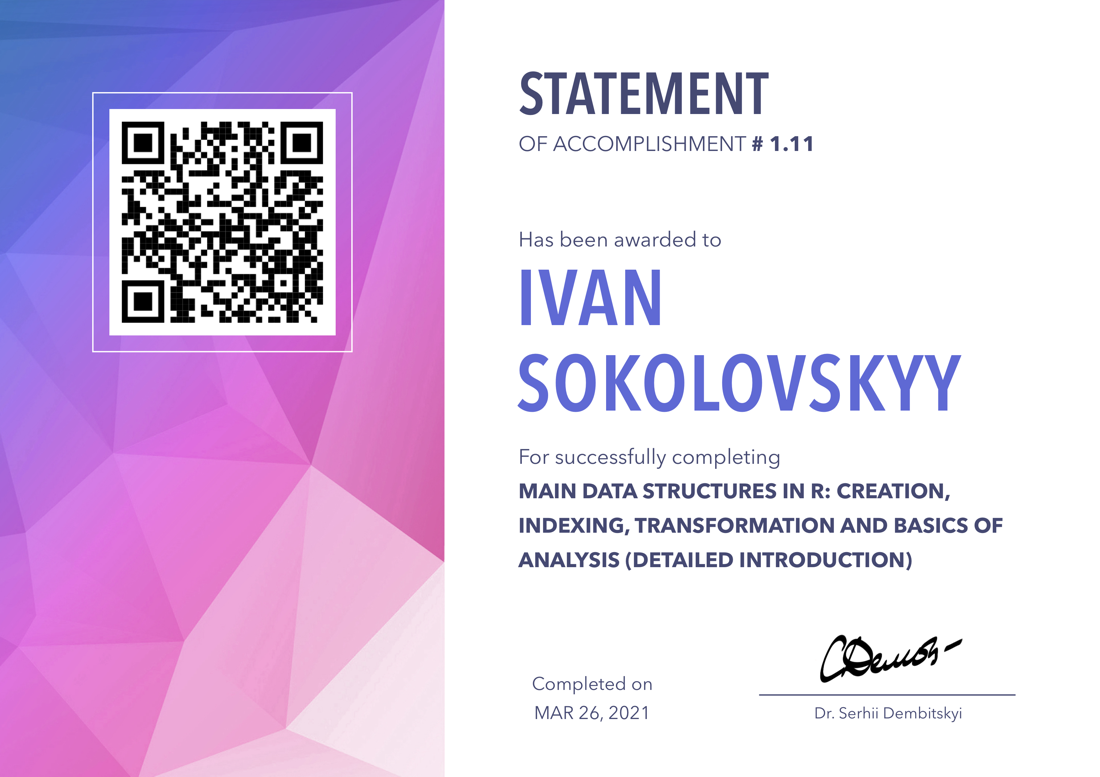
Welcome to my webpage. I am Serhii Dembitskyi, Dr Hab in Sociology, and I specialize in designing sociological tests, leading and consulting on research projects, data analysis, studies of political culture and individual well-being, and in organizing courses of the R programming language.
The last 14 years of my professional activity are connected with the Institute of Sociology of the National Academy of Sciences of Ukraine. At this stage, I am the Deputy Director and the Leading Researcher in the Department of Methodology and Methods of Sociology. I am also the author of 3 individual monographs, more than 80 scientific articles, and 8 sociological tests designed to measure political culture and individual well-being.
Over the past 10 years, I have been leading the following research projects:
Since 2020, I have been the head of the "Ukrainian Society" sociological monitoring conducted by the Institute of Sociology of the National Academy of Sciences of Ukraine since 1994.
The last 14 years of my professional activity are connected with the Institute of Sociology of the National Academy of Sciences of Ukraine. At this stage, I am the Deputy Director and the Leading Researcher in the Department of Methodology and Methods of Sociology. I am also the author of 3 individual monographs, more than 80 scientific articles, and 8 sociological tests designed to measure political culture and individual well-being.
Over the past 10 years, I have been leading the following research projects:
- Stress states of Ukraine's population in the context of war: prevalence, risk groups and ways of compensation (2023-2024);
- The Use of the "Political Seat" sociological test to Assess the Ukrainian President's Performance: Methodological and Substantive Aspects (2022);
- A Systemic Approach to the Sociological Study of Individual Values: Empirical Implications (2021-2022);
- Indicators of National Resilience in the Dimension of Public Opinion (2021);
- Social Prerequisites and the Image of Civilizational Subjectivity of Ukraine in Mass Consciousness (2020);
- Political Culture of Ukrainian Society: Tendencies of Development in Terms of New Challenges (2018-2019);
- Psychological Distress in Ukrainian Society: Factors and Prevalence (2017-2018).
Since 2020, I have been the head of the "Ukrainian Society" sociological monitoring conducted by the Institute of Sociology of the National Academy of Sciences of Ukraine since 1994.
An important part of my scientific interests is the development of sociological tests, i.e. special measuring methods that provide valid and reliable data and can be used in mass surveys.
My doctoral dissertation on the development of sociological tests is in the public domain.
The list and a brief description of the tests I developed are given below:
My doctoral dissertation on the development of sociological tests is in the public domain.
The list and a brief description of the tests I developed are given below:
SCL-9-NR
SCL-9-NR is a sociological test designed to measure psychological distress in mass surveys. Since 2016, the test has been included in the sociological monitoring of the Institute of Sociology of the National Academy of Sciences of Ukraine.
You can read on the test development and use in my monograph or this article.
You can read on the test development and use in my monograph or this article.
IPPT
INTERPERSONAL POLITICAL-PSYCHOLOGICAL TENSION is a sociological test designed to measure specific psychological distress caused by political conflicts. Various versions of the test were used in representative surveys, as well as in surveys with online audience.
Kyiv International Institute of Sociology provided support for one of the stages in the test development.
You can read on the test development and use in this article.
Kyiv International Institute of Sociology provided support for one of the stages in the test development.
You can read on the test development and use in this article.
IVI-13
INDIVIDUAL VALUES AND INTERESTS – 13 is a sociological test aimed at determining the status of 13 objects that potentially represent values, and rating them from an individual perspective.
At the moment, the test is in development. You can read on its conceptual foundations and some results of its application in this article: Ukrainian version, Russian version.
At the moment, the test is in development. You can read on its conceptual foundations and some results of its application in this article: Ukrainian version, Russian version.
ISVP-11
INDEX OF SOCIETAL VALUES PROVISION – 11 is a sociological test aimed at assessing the degree of provision of 11 supra-individual values from the perspective of the population as a whole or its individual groups. The test was used in the national report "Ukraine as a Civilizational Subject of History and Modernity".
Articles on the features of the test are currently in print.
Articles on the features of the test are currently in print.
GEOPOL
GEOPOL is a sociological test designed to assess the geopolitical orientations and attitudes of respondents towards certain geopolitical directions. This test provided the greatest amount of information on the geopolitical orientations of Ukrainian population towards the European Union and the Russian Federation. The test has been used in a number of socio-political research projects since 2017.
The features of the test development are outlined in my individual monograph "Political Culture in Ukrainian Society: Development Trends under Current Challenges", which is not yet available online.
The features of the test development are outlined in my individual monograph "Political Culture in Ukrainian Society: Development Trends under Current Challenges", which is not yet available online.
IAIN
INDEX OF ANOMIE INSUFFICIENCY OF NORMS is a sociological test designed to assess the level of anomie in society. In its theoretical sense, the test continues the tradition founded by Robert Merton.
You can read on the test development and use in this article.
You can read on the test development and use in this article.
GSR-5
GENERALIZED STATE REALITY – 5 is a sociological test designed to categorize respondents according to the social discourses they rely on when assessing various aspects and events of socio-political life, as well as the actions of politicians and other public figures.
The test was developed with the support of Kantar Ukraine, The Estonian-Ukrainian programme Resilient Ukraine, Sociological Group «Rating». Articles on the features of the test are currently in print.
The test was developed with the support of Kantar Ukraine, The Estonian-Ukrainian programme Resilient Ukraine, Sociological Group «Rating». Articles on the features of the test are currently in print.
POLSE
POLITICAL SEAT is a sociological test aimed at constructing a generalized image of a politician from the perspective of various electoral groups.
The test was developed with the support of the Razumkov Centre.
Articles on the test development are in preparation. Test results on Volodymyr Zelenskyy can be found in the Razumkov Centre report.
The test was developed with the support of the Razumkov Centre.
Articles on the test development are in preparation. Test results on Volodymyr Zelenskyy can be found in the Razumkov Centre report.
I am experienced in cooperating with sociological centers in order to conduct representative surveys as part of the implementation of my own research projects or those of my partners. It includes preparing documents and research tools, participating in tenders, and coordinating the terms of a survey. Such projects include, for example, the study of Ukrainian society's political culture, "Ukrainian Society" sociological monitoring, the study of informational resilience of the residents in Southern and Eastern Ukraine.
A separate organizational area of my activity is online surveys. I have implemented a number of such methodological surveys on my own (for the residents of Ukraine, Belarus, and the USA). They touched on the subject of interpersonal-political-psychological tension in society. Targeted advertising on Facebook was used to achieve the required sample heterogeneity. In addition, two large-scale projects based on online surveys were implemented in collaboration with IOD.media. The first one studied the state of psychological distress during the first coronavirus wave, the second one dealt with the societal values in Ukraine. Within the framework of these projects, I was responsible for the scientific research support and the analysis of their results.
If you are interested in comparing the results of representative and online surveys, you can read my plenary report at the conference in Kyiv Taras Shevchenko National University (end of 2020).
A separate organizational area of my activity is online surveys. I have implemented a number of such methodological surveys on my own (for the residents of Ukraine, Belarus, and the USA). They touched on the subject of interpersonal-political-psychological tension in society. Targeted advertising on Facebook was used to achieve the required sample heterogeneity. In addition, two large-scale projects based on online surveys were implemented in collaboration with IOD.media. The first one studied the state of psychological distress during the first coronavirus wave, the second one dealt with the societal values in Ukraine. Within the framework of these projects, I was responsible for the scientific research support and the analysis of their results.
If you are interested in comparing the results of representative and online surveys, you can read my plenary report at the conference in Kyiv Taras Shevchenko National University (end of 2020).
I also specialize in the processing and statistical analysis of sociological data. I use the R programming language as the main statistical data processing tool. It was developed primarily as a means for analyzing a variety of data and is one of the most flexible ones, as it suits almost all requirements that may arise in data processing.
One of the specific data processing strategies that I can offer the customers based on my scripts in R is concept mapping (the author of this research strategy is Prof. William M. Trochim of Cornell University). Concept mapping is a structured group process that focuses on a project theme or notion and builds a visual concept map that reflects the original notion or theme. Concept mapping can be aimed at solving one of four tasks: assessing project results comprehensively, planning the activities of a group or organization, preparing the basis for an empirical quantitative study, and conducting a group expertise. Concept mapping is explained in detail in the monograph by Mary Kane and William M. Trochim. You can also read on it in my article.
At the current stage, I am developing my own strategy for constructing analytical maps, aimed at detailed segmentation and its visualization in the framework of quantitative electoral or marketing research.
One of the specific data processing strategies that I can offer the customers based on my scripts in R is concept mapping (the author of this research strategy is Prof. William M. Trochim of Cornell University). Concept mapping is a structured group process that focuses on a project theme or notion and builds a visual concept map that reflects the original notion or theme. Concept mapping can be aimed at solving one of four tasks: assessing project results comprehensively, planning the activities of a group or organization, preparing the basis for an empirical quantitative study, and conducting a group expertise. Concept mapping is explained in detail in the monograph by Mary Kane and William M. Trochim. You can also read on it in my article.
At the current stage, I am developing my own strategy for constructing analytical maps, aimed at detailed segmentation and its visualization in the framework of quantitative electoral or marketing research.
At the moment, I am offering a course "Basic Data Structures in R: Creation, Indexing, Transformation, and Basic Analysis (an in-depth introduction)". Taking the course is motivated by the fact that without understanding the nature of the objects used in R and the specifics of working with them (and therefore the possibilities they provide), using R effectively becomes very problematic.
The course covers in detail the following basic data structures:
The course consists of lectures and practical classes.
The course covers in detail the following basic data structures:
- vectors,
- matrices,
- lists,
- data frames.
The course consists of lectures and practical classes.
SAMPLE CERTIFICATE

MY CONTRACTS
E-MAIL
sociotest.solutions [at] gmail.com
PHONE
+38 (O99) 44O-7O-47
FACEBOOK
serhii.dembitskyi